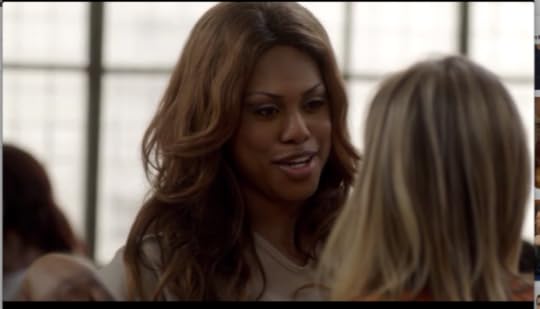Mark Anthony Neal's Blog, page 876
August 9, 2013
Onondaga Leader Oren Lyons, Pete Seeger On International Day of the World's Indigenous Peoples
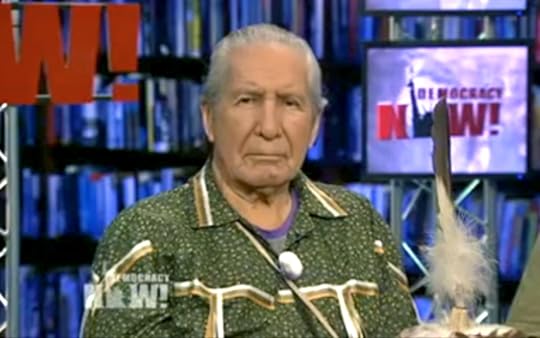 Democracy Now
Democracy NowHundreds of Native Americans and their allies arrive in New York City today after paddling more than a hundred miles down the Hudson River to commemorate the 400th anniversary of the first treaty between Native Americans and the Europeans who traveled here. The event is part of the International Day of the World's Indigenous Peoples, first proclaimed by the United Nations 20 years ago. We speak with Oren Lyons , Faithkeeper of the Onondaga Nation who helped establish the United Nations working group on indigenous peoples in 1982.
"We're concerned about the future, we're concerned about the Earth -- seven generations hence -- and the conduct of people," Oren says. "We wonder, how do you instruct seven billion people as to the relationship to the Earth? Because unless they understand that, and relate the way they should be, the future is pretty dim for the human species." We are also joined by one of their supporters, Pete Seeger, the legendary folk singer, banjo player, storyteller, and activist; and by Andy Mager, project coordinator for the "Two Row Wampum Renewal" campaign and a member of Neighbors of the Onondaga Nation.
Published on August 09, 2013 09:09
August 8, 2013
"Welcome to the Terrordome: Muslims, Malcolm X, and Post 9-11 America"--a Lecture by Sohail Daulatzai
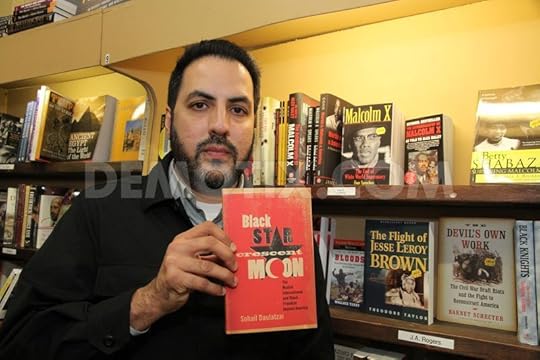
The Muslim Student Association at UC Davis presents:
"Welcome to the Terrordome: Muslims, Malcolm X and Post-9/11 America"
As the profound anti-Muslim racism of the post-9/11 era deepens, the role and place of Muslims in the U.S. is under intense scrutiny by both Muslims and non-Muslims, as questions around "radicalization," citizenship, and belonging continue the shape these debates. But the fears of Islam and Muslims in the United States are not new. In fact, they can be traced back to the presence and legacy of Malcolm X, who sought to internationalize the struggles of Black people in the U.S. and connect them with the struggles taking place throughout the non-white world. As Malcolm X said, "the same rebellion, the same impatience, the same anger that exists in the hearts of the dark people in Africa and Asia, is existing in the hearts and minds of 20 million black people in this country who have been just as thoroughly colonized as the people in Africa and Asia."
In framing white supremacy as a global phenomenon, and understanding the systemic roots of inequality, Malcolm X provides us with a historic lens and contemporary frame for thinking about the role and place of Muslims in the United States, as endless war is waged, racism persists and capitalism wreaks havoc around the world.
Sohail Daulatzai is an Associate Professor in the Department of Film and Media Studies and the Program in African American Studies at the University of California, Irvine. He is the author of Black Star, Crescent Moon: The Muslim International and Black Freedom beyond America (2012) and is the co-editor (with Michael Eric Dyson) of Born to Use Mics: Reading Nas's Illmatic (2009). His writing has appeared in The Nation, Counterpunch, Al Jazeera, Souls, Amer-Asia, Black Routes to Islam, and Basketball Jones, amongst others. He has written liner for the 2012 release of the 20th Anniversary Deluxe Box Set of Rage Against the Machine's self titled debut album, the liner notes for the DVD release of Freestyle: The Art of Rhyme and the centerpiece in the museum catalog Movement: Hip-Hop in L.A., 1980's -- Now.
Co-Sponsored by: The Middle East/South Asia Studies Program (ME/SA), Pakistani Student Association (PSA),and Afghan Student Association (ASA) at UCD.
Published on August 08, 2013 19:50
New York Police Ends Practice of Keeping Innocent New Yorkers in Stop-and-Frisk Database
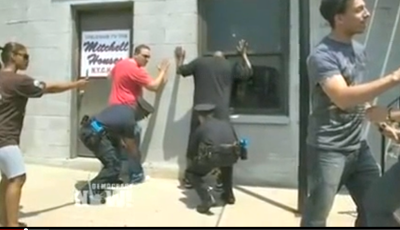 Democracy Now
Democracy NowIn a settlement with the New York Civil Liberties Union, the New York City Police Department agreed to stop storing the names of people who were arrested or issued a summons after being stopped and frisked -- and later cleared of any criminal wrongdoing. For years, police have used the database to target New Yorkers for criminal investigations, even though it includes people who were victims of unjustified police stops.
Since 2002, the police department has conducted more than five million stops and frisks. The vast majority of those stopped have been black and Latino. According to the police department's own reports, nearly nine out of 10 New Yorkers stopped and frisked have been innocent. We speak to Donna Lieberman, executive director of the New York Civil Liberties Union.
Published on August 08, 2013 18:57
'Dork Diaries' Reveal Secrets Of 'Not-So-Fabulous' Teen Life
Published on August 08, 2013 17:04
Poetry from Randi Gill-Sadler: "In North Carolina, We Sip Tea" #VotingRights
Published on August 08, 2013 09:47
August 7, 2013
Cable Companies Urged to Make Public Access Television Shows More Accessible
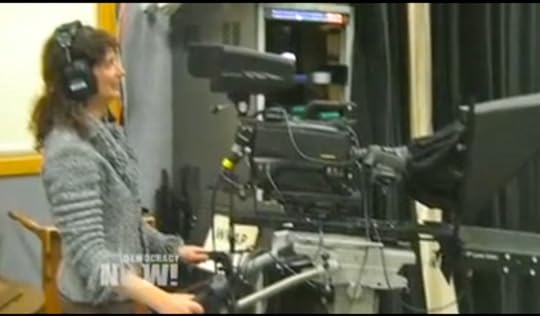 Democracy Now
Democracy NowMany cable companies refuse to list the titles of shows that air on public access television stations in their on-screen guides. Now media activists are pushing for the Federal Communications Commission (FCC) to intervene.
In 2010, President Obama signed into law the 21st Century Communications and Video Accessibility Act (CVAA), which aims to make modern digital media platforms fully accessible to people who are deaf, hard of hearing, blind, or with low vision. The CVAA will be implemented largely through rules drafted and enforced by the FCC, a regulatory body that is widely criticized as being too close to the industries it is supposed to regulate. Today we look at how the FCC is implementing two sections of the CVAA. Sections 204 and 205 of the law specify that video service and equipment providers make it easier for users to turn on closed captioning, and also require that on-screen channel guides be presented in a way that allows for the text on the screen to be audio interpreted, so that people who are blind or have low vision, can hear the program descriptions. For years now, established cable companies along with new video service providers like AT&T and Verizon, have been downgrading the capacity of PEG TV channels, including the elimination of detailed, on-screen program descriptions from these noncommercial, community media institutions, effectively marginalizing the channels and the content they provide. We speak with Mitsuko Herrera, a member of the Federal Communications Commission's Consumer Advisory Committee.
Published on August 07, 2013 18:18
Tell Me More: 'Orange Is The New Black' Transgender Actress Calls Role 'Complicated'
Published on August 07, 2013 18:00
George Duke, A Soul Treasure (1946-2013) by Guthrie P. Ramsey, Jr.
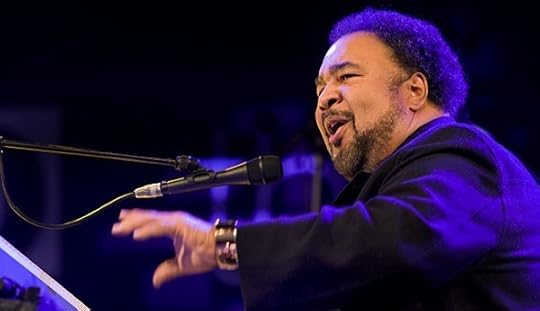 George Duke, A Soul Treasure (1946-2013)
by Guthrie P. Ramsey, Jr. | Dr. Guy’s MusiQology special to NewBlackMan (in Exile)
George Duke, A Soul Treasure (1946-2013)
by Guthrie P. Ramsey, Jr. | Dr. Guy’s MusiQology special to NewBlackMan (in Exile)During the long process of pulling together my CD The ColoredWaiting Room , I was spending a lot of time hanging around the studio of my co-producer, Jerry Thompson from Philly. Anyone who knows producers understands that these cats are hopeless electronics geeks. A new piece of equipment could drop in the middle of an Amazon rain forest, and they’ll know about five minutes later, order it the day they learn it’s available, and will spend sleepless nights before its mastered—usually about three nights, tops.
JT was thrilled to show me George Duke: Soul Treasures, which is a group of looped samples of Duke playing the keys and described as “a treasure trove for producers looking for instant soul for their tracks.” It’s easy to see why such a product exists, and not only because keyboard playing is becoming rare among “producers” in the age of hip-hop. Duke had what one could call a highly personalized sonic signature, a “voice” that made his chord progressions, his touch, his chord voicings, even the recordings he produced for others, instantly recognizable. He had the golden touch.
He was an early musical influence: I’ve been following his career and loving his music since the seventies. Like many, my introduction began with the party hit “Reach for It.” I remember when I first heard it on a holiday trip to Chicago while living on the West Coast in my late teens. “The Spank” was the popular dance at that time, and the anthem “Reach for It” was perfect: bass heavy, funky back beat, gospel-styled vocals, call and response, Fender Rhodes drenched—a classic party song.
My exploration of Duke led me to his earlier work in mainstream jazz and rock. The gestures he learned in those settings would mark his work in R&B, funk and fusion as many of his songs feature his crafty and soulful solo statements and beautiful harmonic changes. Like Herbie Hancock and Patrice Rushen, the other keyboard playing jazz-Funkateers of the seventies, he was at home in a number of styles.
When I learned he had passed away a couple of days ago, it came as a complete shock. For some reason his latest CD Dreamweaver had been on repeat during my daily listenings. I was particularly hooked on “Brown Sneakers,” which features electric bassist Michael Manson, a phenomenal musician I grew up with. The last time I saw George Duke play he and Mike were laying it down for real at the Clifford Brown Jazz Festival a couple of summers ago. (Their contrapuntal work on “Brown Sneakers” knocks me out).
What I loved about it—and I think this is what we all loved and will miss—is how he, like few others, could connect with audiences. As he rolled through his song list, we were lifted physically, mentally, emotionally, and spiritually. He had us in the palm of his talented hands. It was like church at the jazz fest.
I listened to Jamal Ahmad’s The Soul of Jazz thorough and thrilling four-hour tribute to Duke on WCLK, Atlanta and was stunned at the breadth of his work, how timely it sounded, the sheer volume of it all and its remarkable consistency. As the songs rolled out, I also realized that because of that consistency, George Duke’s music had been there with me, marking my time in the world at every stage of my adult life. He would always manage to drop a tune that I would seize on and repeat until times got better. And I would celebrate to his music: he was always perfect for the party, as any DJ—professional or jackleg—knows.
What I loved about his expansive musicianship was his compositional approach. Whether in fusion, R&B, jazz or funk, Duke’s sense of form was always adventuresome—never formulaic. His crafty harmonic praxis involved surprising harmonic and rhythmic embellishments within repetitive block forms reminiscent of contemporary black church music. In other words, he reveled in the joy of musical simplicity by toying, stretching, polishing, and refining—without losing the “soul.”
Whether playing a synth solo on Jill Scott’s “Whenever You’re Around” or laying down the funk on a Kurt Whalum “The Gospel According to Jazz” tune, he’d catch the listener off-guard and lead through a variety of unexpected turns of a phrase or a riff and then work it until the job was done, especially in live settings.
Duke's vocals, his other reliable toolbox—were generally performed in a pleasant, unforced falsetto unless he was doubling someone an octave below. Like his overall approach, they were marked by an immediacy of communicative power: we felt it and wanted to sing along full-throated at the party while busting a move. (You know the look, eyes-closed tight, head back, arms in the air, moneymaker shaking).
The thing I admire most about George Duke is that he achieved in his life what many musicians desire: to make people happy and to lessen their burdens, to create art of tangible value, to fulfill one’s artistic potential, to leave folk wanting more. Job well done, sir.
True, you left us too soon, but you also left us with more than enough to cherish. He put the tingle in our hipbones, took us to the bridge, and dropped us off into some funk. And that’s a good plan on any given day, as he taught us so well.
***
Guthrie P. Ramsey, Jr. ‘s latest book is The Amazing Bud Powell: Black Genius, Jazz History and the Challenge of Modern Jazz (University of California Press)
Published on August 07, 2013 17:28
Trailer: 'The New Black' (dir. Yoruba Richen)
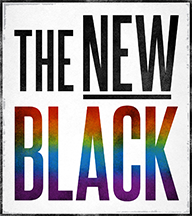
The New Black
The New Black is a documentary that tells the story of how the African-American community is grappling with the gay rights issue in light of the recent gay marriage movement and the fight over civil rights.
Yoruba Richen is documentary filmmaker who has directed and produced films in the United States, Africa, South America, and Southeast Asia. Yoruba’s award-winning film, Promised Land, premiered at the Full Frame Documentary Festival and has screened at numerous festivals around the world. It received a Diverse Voices Co-Production fund award from the Corporation for Public Broadcasting and won the Fledgling Fund Award for Social Issue Docum
newblackfilm.com @newblackfilm
Published on August 07, 2013 11:20
ReelBlack: Spike Lee On Hollywood and Kickstarter @ the BlackStar Film Festival
ReelBlack
Indie film pioneer SPIKE LEE recently visited the BlackStar Film Festival in Philadelphia to participate in a panel discussion and to stump for his new Kickstarter Campaign.
Published on August 07, 2013 07:23
Mark Anthony Neal's Blog
- Mark Anthony Neal's profile
- 30 followers
Mark Anthony Neal isn't a Goodreads Author
(yet),
but they
do have a blog,
so here are some recent posts imported from
their feed.




